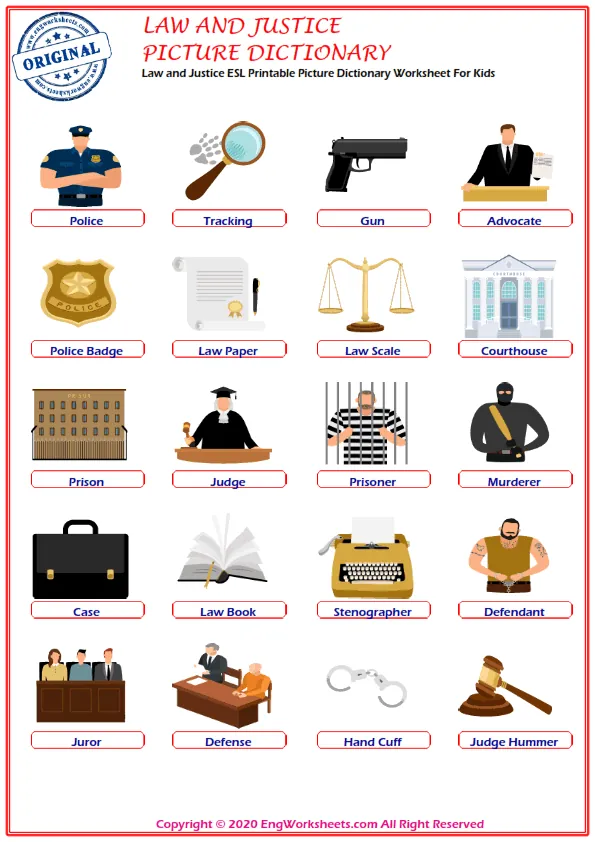
Mastering the Lexicon: The Indispensable Role and Design of Legal Vocabulary Worksheets
The legal profession, at its core, is a discipline built upon language. Precision, clarity, and an unwavering commitment to the correct interpretation and application of terms are not mere preferences but fundamental necessities. From drafting contracts and preparing court documents to engaging in courtroom arguments or advising clients, every word carries weight, every phrase holds potential legal implications. For those entering this intricate world, or even seasoned professionals seeking to sharpen their linguistic tools, the sheer volume and specialized nature of legal terminology can be daunting. This is where the power of targeted learning resources becomes evident, and among the most effective are Legal vocabulary worksheets.
This comprehensive article will delve into the critical importance of a robust legal vocabulary, explore why worksheets stand out as an exceptionally effective learning methodology, examine the various types of Legal vocabulary worksheets available, highlight their profound benefits, and provide practical guidance on designing and integrating them into any learning strategy.
The Indispensable Role of Legal Vocabulary

Legal language is a distinct register, often characterized by archaic terms, Latin maxims, precise definitions, and nuanced distinctions. It is not merely a collection of fancy words but a system designed to convey complex ideas with absolute accuracy, minimizing ambiguity and ensuring consistent interpretation. A strong grasp of legal vocabulary is crucial for several reasons:

- Precision in Communication: In law, a single misplaced word can alter the meaning of a clause, invalidate a contract, or lead to misinterpretations with significant consequences. Understanding the subtle differences between terms like "assault" and "battery," or "licence" and "easement," is paramount.
- Effective Comprehension: To understand statutes, case law, academic articles, or professional correspondence, one must first comprehend the specialized language in which they are written. Without this foundational understanding, critical analysis and informed decision-making become impossible.
- Credibility and Professionalism: Using correct legal terminology not only demonstrates competence but also builds trust and credibility with clients, colleagues, and the court. It signals that one is an authority in their field.
- Avoiding Misinterpretation and Litigation: Ambiguous language is a common cause of disputes and litigation. A thorough understanding and precise use of legal terms can prevent misunderstandings and protect legal interests.
- Global Practice: With increasing globalization, legal professionals often interact across jurisdictions. While legal systems differ, a foundational understanding of common law terminology, for instance, can provide a significant advantage.
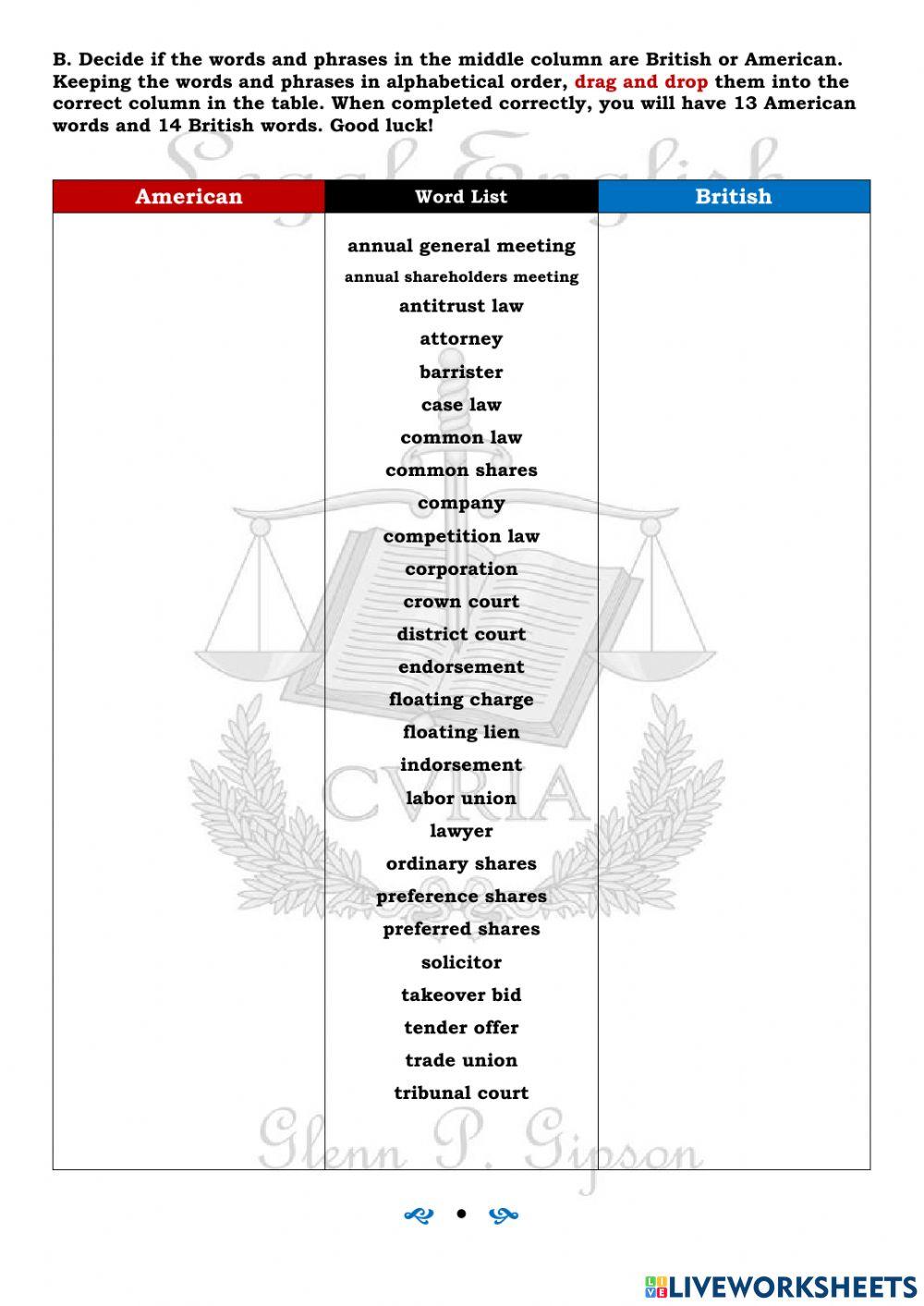
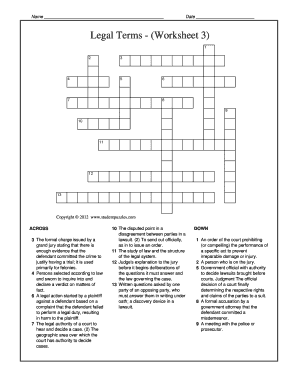

Given this complexity, how does one effectively acquire and retain such a specialized lexicon? While reading legal texts and attending lectures are vital, passive exposure often falls short. Active engagement and systematic reinforcement are key, and this is precisely where Legal vocabulary worksheets excel.
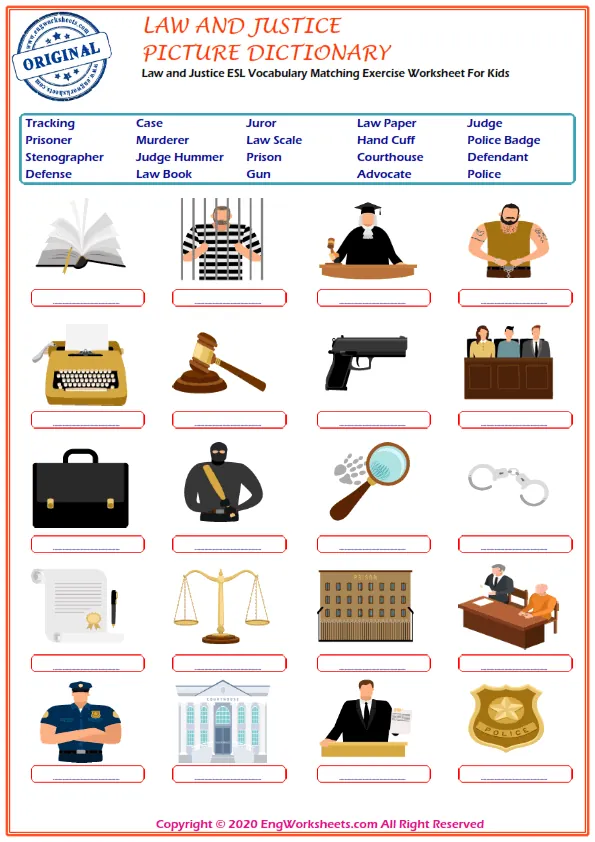
The Efficacy of Worksheets as a Learning Tool
Worksheets are more than just busywork; they are structured pedagogical tools designed to facilitate active learning, reinforce concepts, and test comprehension. Their efficacy in vocabulary acquisition stems from several principles of learning:
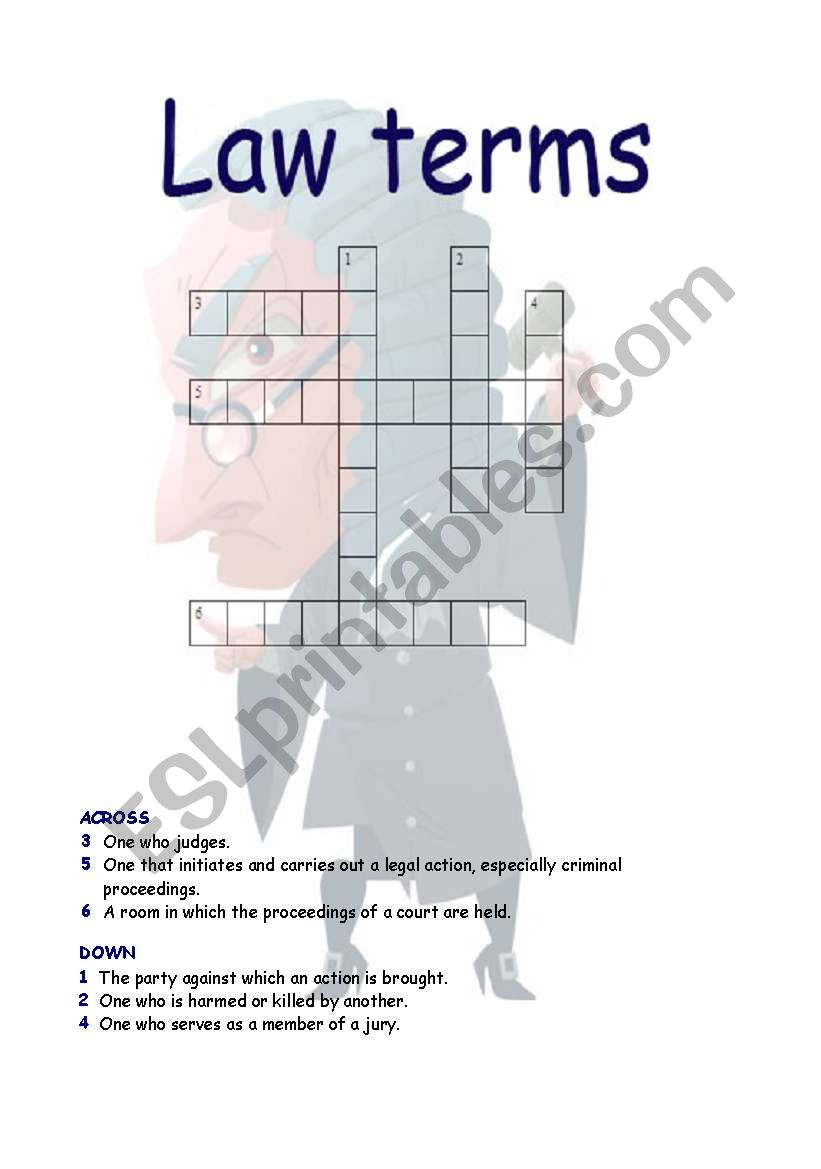
- Active Recall: Unlike passive reading, worksheets demand that learners actively retrieve information from memory, strengthening neural pathways and improving retention.
- Spaced Repetition: Worksheets can be revisited over time, allowing for spaced repetition, a proven method for moving information from short-term to long-term memory.
- Contextual Learning: Effective worksheets present terms within relevant legal contexts, helping learners understand not just definitions but also appropriate usage.
- Varied Engagement: Different exercise types cater to various learning styles and keep the learning process engaging, preventing monotony.
- Immediate Feedback: When accompanied by answer keys, worksheets provide immediate feedback, allowing learners to correct misunderstandings on the spot.
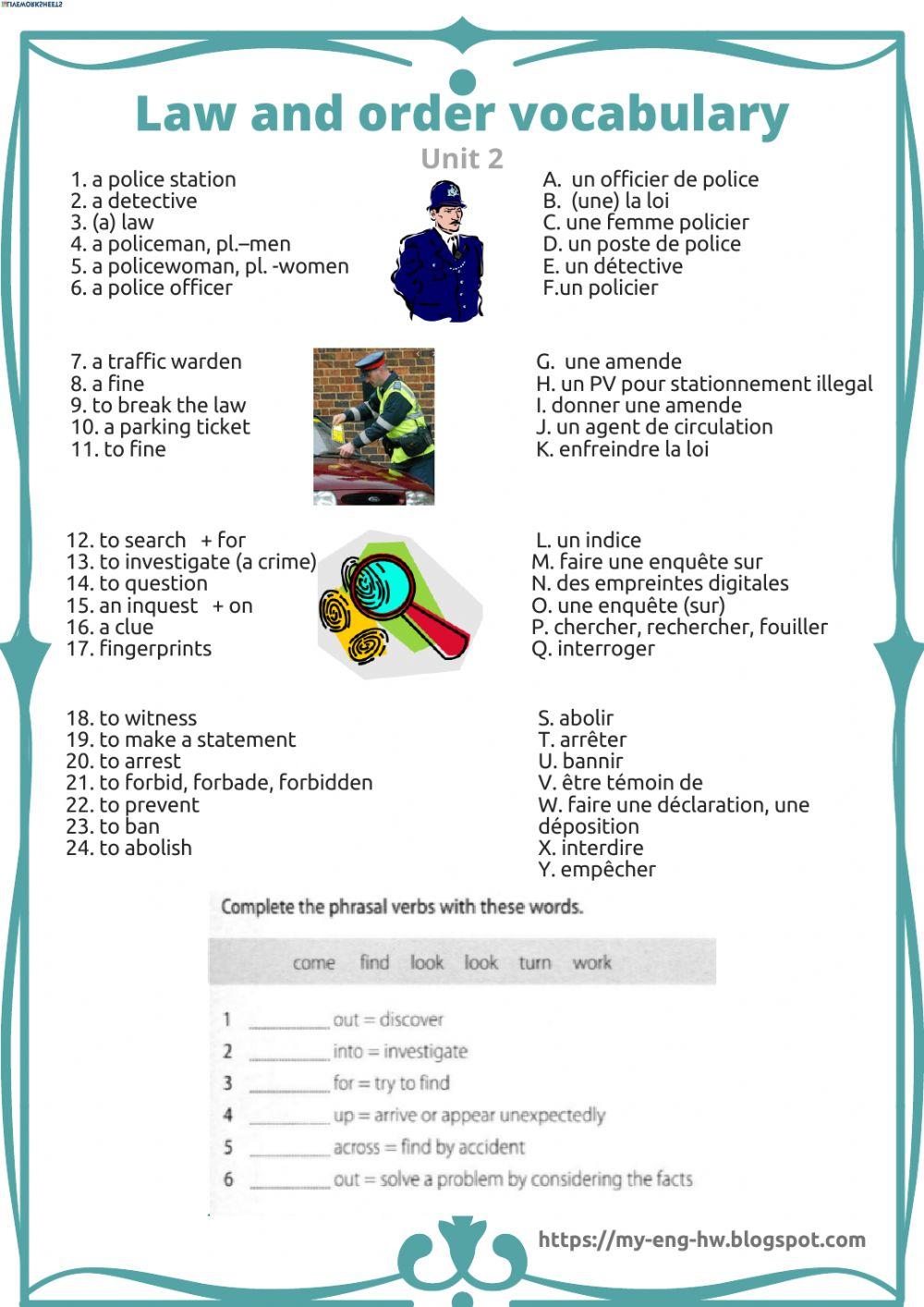

Types of Legal Vocabulary Worksheets
The versatility of Legal vocabulary worksheets lies in the myriad of exercise formats they can employ, each targeting different aspects of comprehension and recall.
-
Matching Exercises:
- Term to Definition: The most common type, pairing a legal term (e.g., "stare decisis") with its precise definition ("the principle that courts should follow precedents").
- Term to Synonym/Antonym: Pairing terms with similar or opposite meanings (e.g., "plaintiff" to "claimant," or "guilty" to "innocent").
- Term to Related Concept: Connecting a term to a broader legal area or principle (e.g., "habeas corpus" to "constitutional law").
-
Fill-in-the-Blanks:
- Contextual Sentences: Learners complete sentences using appropriate legal terms from a word bank or from memory (e.g., "The defendant pleaded _____ to the charges." Answer: "guilty" or "not guilty"). This tests understanding of usage and context.
- Case Summaries/Paragraphs: Providing a short legal text with missing terms, requiring the learner to insert the correct vocabulary.
-
Multiple Choice Questions:
- Presenting a term and asking for its correct definition from several options.
- Presenting a sentence with a missing word and asking the learner to choose the best legal term to complete it.
- Asking to identify the correct usage of a term in a given sentence.
-
Sentence Completion/Construction:
- Providing a list of legal terms and asking learners to use each term correctly in an original sentence, demonstrating their understanding of its meaning and application.
-
Crossword Puzzles and Word Searches:
- Engaging and fun, these puzzles can reinforce terms and definitions in a more relaxed format. Crosswords are particularly effective as they require both recall and spelling accuracy based on clues.
-
True/False Statements:
- Presenting statements about legal terms or concepts that learners must identify as true or false, often requiring a correction if false to deepen understanding.
-
Short Answer/Essay Questions:
- For more advanced learners, these exercises might involve defining terms in their own words, explaining the distinction between similar terms, or applying terms within a brief hypothetical scenario.
-
Case Study/Scenario-Based Exercises:
- Presenting a brief legal scenario and asking learners to identify relevant legal terms, explain their meaning within the context, or use them to formulate an argument or analysis. This is invaluable for practical application.
Benefits of Utilizing Legal Vocabulary Worksheets
The systematic use of Legal vocabulary worksheets offers a multitude of benefits for anyone navigating the complexities of legal language:
- Enhanced Comprehension and Retention: Regular engagement with worksheets significantly boosts understanding and long-term memory of legal terms. The active nature of the exercises promotes deeper processing than passive reading.
- Improved Accuracy and Precision: By repeatedly practicing the correct usage and definitions, learners reduce the likelihood of misusing words or employing vague language, which is critical in a field where every word can have significant implications.
- Increased Confidence: A strong vocabulary foundation translates directly into increased confidence in legal discussions, writing, and analysis. This confidence is crucial for both academic success and professional effectiveness.
- Self-Paced and Flexible Learning: Worksheets allow learners to progress at their own pace, focusing on areas where they need more practice. They can be used independently or as a supplement to formal instruction.
- Foundation for Advanced Legal Studies: A solid grasp of foundational legal vocabulary is essential for tackling more complex legal concepts, theories, and case law. It provides the necessary scaffolding for higher-level learning.
- Practical Application Skills: Scenario-based worksheets bridge the gap between theoretical knowledge and practical application, preparing learners for real-world legal challenges.
- Identification of Knowledge Gaps: Incorrect answers on worksheets immediately highlight areas where a learner needs to focus more attention, making study time more efficient and targeted.
- Reduced Anxiety: Approaching challenging legal texts becomes less daunting when a learner is equipped with the necessary vocabulary, reducing frustration and improving the overall learning experience.
Designing Effective Legal Vocabulary Worksheets
Creating impactful Legal vocabulary worksheets requires thoughtful planning and adherence to pedagogical best practices. Here are key considerations:
-
Target Audience and Learning Objectives:
- Beginner: Focus on fundamental terms, clear definitions, and basic contextual usage.
- Intermediate: Introduce more nuanced terms, synonyms/antonyms, and slightly more complex sentences.
- Advanced: Incorporate Latin maxims, archaic terms, distinctions between similar concepts, and require application in hypothetical scenarios.
- Clearly define what learners should be able to do after completing the worksheet (e.g., "define common torts," "distinguish between civil and criminal law terms").
-
Authentic Legal Context:
- Terms should not be presented in isolation. Use sentences, short paragraphs, or excerpts from legal documents (simplified if necessary) that reflect real-world legal discourse. This helps learners understand the function and register of the terms.
-
Variety of Exercise Types:
- Mix and match different formats (matching, fill-in-the-blanks, multiple choice, short answer) within a single worksheet or across a series. This keeps learners engaged and tests different facets of comprehension and recall.
-
Clear and Concise Instructions:
- Ensure that instructions for each exercise are unambiguous and easy to follow. Provide an example if the exercise type is complex or new to the learner.
-
Appropriate Difficulty and Progression:
- Start with easier exercises and gradually increase the cognitive load. Introduce terms incrementally rather than overwhelming learners with too many new words at once.
-
Inclusion of an Answer Key:
- An answer key is crucial for self-assessment and immediate feedback. It allows learners to correct their mistakes and understand the correct usage without external intervention.
-
Visual Aids and Layout:
- A clean, well-organized layout improves readability. Consider using bold text for terms, bullet points for definitions, and sufficient white space. For some learners, relevant images or diagrams can also be beneficial.
-
Review and Revision:
- Test the worksheet yourself before distributing it. Are there any ambiguities? Are the answers clear? Is the content accurate? Regularly update worksheets to reflect changes in legal terminology or pedagogical approaches.
Integrating Worksheets into Learning Strategies
Legal vocabulary worksheets can be effectively integrated into various learning environments:
- Self-Study: Learners can use worksheets independently to supplement textbooks, prepare for exams, or simply improve their general legal English.
- Classroom Instruction: Educators can use worksheets as warm-up activities, in-class exercises, homework assignments, or assessment tools. They facilitate active participation and allow teachers to gauge student understanding.
- Legal English Courses: Worksheets are a cornerstone of specialized Legal English programs, providing structured practice for non-native speakers or those new to the legal field.
- Professional Development: Even experienced legal professionals can use advanced worksheets to refresh their memory on niche areas of law, prepare for new roles, or maintain their linguistic sharpness.
- Tutoring Sessions: Tutors can customize worksheets to address specific weaknesses identified in their students, providing targeted and efficient practice.
Conclusion
In a profession where precision is paramount and the stakes are often incredibly high, a mastery of legal vocabulary is not merely an advantage but a non-negotiable requirement. Legal vocabulary worksheets emerge as an indispensable tool in this pursuit, offering a structured, active, and highly effective means to acquire, reinforce, and apply the specialized language of the law.
By systematically engaging with diverse exercise types, contextualizing terms within authentic legal scenarios, and consistently reviewing and applying knowledge, learners can transform the daunting task of vocabulary acquisition into an empowering journey. Whether for students embarking on their legal education, professionals seeking to refine their linguistic acumen, or educators striving to equip the next generation, well-designed and thoughtfully utilized Legal vocabulary worksheets are the bedrock upon which true legal linguistic competence is built, paving the way for clearer communication, deeper comprehension, and ultimately, greater success in the intricate world of law.
